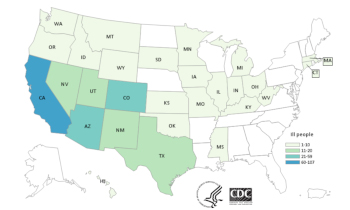
| Dec. 2018 | |||||||||||
| Top stories | |||||||||||
| In the news | |||||||||||
| Photos | |||||||||||
| Contact us | |||||||||||
| Archive | |||||||||||
|
Cases of Salmonella increase in multistate outbreak |
December 13, 2018 --
Federal health officials recently announced a nearly 50 percent increase in the number of confirmed Salmonella cases linked to ground beef and other raw beef products.
 More than 28 states are part of a Salmonella outbreak confirmed in 333 people as of Dec. 12. The outbreak has been linked to ground beef and other raw meat products.
More than 28 states are part of a Salmonella outbreak confirmed in 333 people as of Dec. 12. The outbreak has been linked to ground beef and other raw meat products.
In its Dec. 12 alert, the Centers for Disease Control and Prevention reported 333 confirmed cases of Salmonella Newport in 28 states, a jump from 246 cases in 25 states reported on Nov. 15.
The outbreak has been linked to more than 12 million pounds of raw beef recalled by JBS Tolleson, and sold between July 26 and Sept. 7, 2018.
The Arizona-based company initially recalled 6.9 million pounds of its ground beef and other beef products on Oct. 4. Two months later, it expanded its recall by an additional 5 million pounds.
The USDA’s Food Safety and Inspection Service (FSIS) reported that “The products subject to recall bear establishment number ‘EST. 267’ inside the USDA mark of inspection. These items were shipped to retail locations and institutions nationwide.”
FSIS expressed concern that some of these raw beef products, including ground beef, were purchased and still remain in freezers. The agency directed consumers to throw these products away or return them to the place of purchase.
A list of retailers who sold the Tolleson products is available on the FSIS website.
CDC reminds consumers and restaurants that they may prevent the spread of foodborne illnesses such as Salmonella by following its Four Steps to Food Safety.
Salmonella is one of the most common bacterial foodborne illnesses. Symptoms include diarrhea, abdominal cramps and fever within 12 to 72 hours after eating a contaminated product.
“The illness usually lasts four to seven days,” FSIS reported on its website. “Most people recover without treatment. In some persons, however, the diarrhea may be so severe that the patient needs to be hospitalized. Older adults, infants, and persons with weakened immune systems are more likely to develop a severe illness. Individuals concerned about an illness should contact their health care provider.”